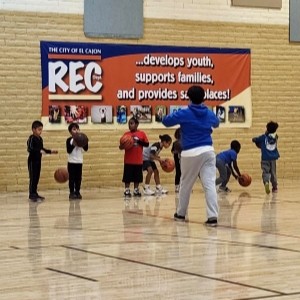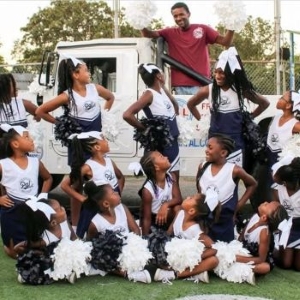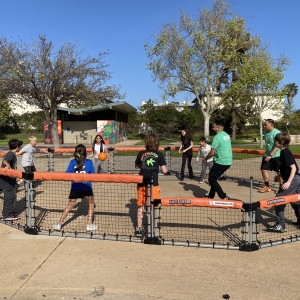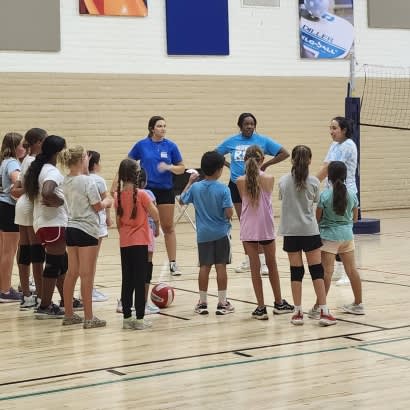In parks and recreation, youth sports are more than just games and scores. They give youth chances to learn, grow and build relationships that last well beyond the season. As a park and recreational professional, you play a key role in making sure that every coach has the resources and guidance to move beyond coaching and become a mentor — helping young athletes thrive both on and off the field.
To support this, NRPA created this guide to help coaches, park and recreation professionals and program leaders weave mentoring into their youth sports programs. This guide is part of the Level Up: Coaching Tools to Inspire, Connect and Lead Through Sports resource hub — a comprehensive hub designed to equip coaches with the tools, strategies and mindset needed to become effective mentors and strengthen youth sports programs.
Access the Level Up Coaches Hub
The Impact of Mentoring in Youth Sports
Mentoring through sports means leveraging the structure of practices, games and team dynamics to create connections and foster personal growth. When coaches take on the role of mentors, they have the opportunity to lead teams where young people feel safe, supported and empowered.
Being consistent and intentional in those everyday moments like listening on the sidelines, offering encouragement after a tough play or celebrating effort helps kids develop life skills that last well beyond the last game. These connections teach teamwork, communication, leadership and resilience while boosting confidence and keeping young athletes engaged.
When leagues make mentoring part of their culture, sports become a platform for growth that strengthens both athletes and the community.
Training Coaches to Be Mentors
Coaches need more than good intentions. They need training, tools, and guidance, and that's where park and recreation professionals and program leaders can make a difference. By providing access to structured training and resources, you ensure coaches can build trust, model positive behaviors and foster meaningful connections with athletes.
The Level Up hub was designed with this in mind. It offers interactive modules, professional development opportunities and practical tools that coaches can put into immediate action. By supporting coaches with these resources, park and recreation professionals and program leaders help ensure mentoring thrives and young athletes can succeed.
Putting Mentoring Principles into Practice
Mentoring works best when it is intentional. Tools like the NRPA Youth Mentoring Framework can guide coaches in embedding mentoring into weekly practices and games, connecting each session to core themes like support, responsibility and integrity.
For example, a coach might begin practice by introducing the theme of support and asking players to reflect on what support looks like on the field. Throughout the practice, the coach models supportive behavior, recognizes athletes who encourage their teammates and reinforces the importance of being there for one another. At the end of practice, the team gathers for a brief reflection time, sharing how support showed up during practice and how it felt to give and receive it. Small, consistent actions like these turn everyday practices into opportunities for growth, helping players build life skills and develop trust.
Stories From the Field

City of El Cajon (California) Parks and Recreation
El Cajon's group mentoring program uses sports clinics for basketball, indoor soccer and volleyball as a structured way to connect youth with mentors and life lessons. Their model emphasizes both athletic and personal development.
"Youth participants build friendships, improve their skills and grow in confidence," Tim O'Melia, parks and recreation supervisor for City of El Cajon, shared. "They're learning teamwork, communication and leadership through structured sports activities."

City of North Little Rock (Arkansas)
In North Little Rock, the Police Athletic League (PAL) offers mentoring through league sports such as baseball, flag football and cheerleading. For this program, sports are about more than teaching the game; it's about building lasting relationships between youth, coaches and the broader community. Their program offers free access to sports in a safe environment, especially benefiting youth in under-resourced areas.
"We not only teach them a sport but build families on the field and a culture of working together," shared their PAL Program Coordinator, Officer Shelby Hunter. "Sports build character, leaders and small families within the community. Most importantly, the participants are outside and staying in shape!"

Imperial Beach (California) Parks and Recreation
Imperial Beach takes a unique approach by using non-traditional sports like ultimate frisbee, pickleball and spikeball to create a level playing field for all participants. These unfamiliar games allow youth to start from the same place and grow together, fostering connection and cooperation.
"The first 90 minutes of our sessions are dedicated to active play. This time is not just about movement; it's about building rapport, creating a positive group culture and laying the foundation for meaningful discussions," shared Malo Lutu, parks, recreation and community services supervisor for City of Imperial Beach.
Using the Youth Mentoring Framework, staff guide conversations and activities that support emotional development and trust. The result is a well-rounded program where youth are more physically active, build peer connections and feel comfortable expressing themselves.
Create Lasting Impact
Mentoring through sports creates lasting impact — on the field and beyond. With the right tools, training and intentional practices, coaches can help youth grow into confident, connected and resilient individuals. We encourage all park and recreation agencies to take the next step in building a culture of mentorship within their sports programs.
This page is supported by Grant #15PJDP-22-GG-03844-MENT awarded by the Office of Juvenile Justice and Delinquency Prevention, Office of Justice Programs, U.S. Department of Justice. The opinions, findings, and conclusions or recommendations expressed in this material are those of the author(s) and do not necessarily reflect those of the Department of Justice.
PHOTO:Youth participate in volleyball program. Photo courtesy of City of El Cajon (California) Parks and Recreation.


